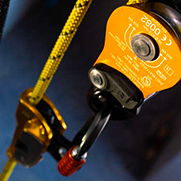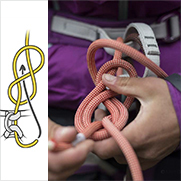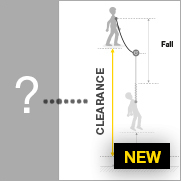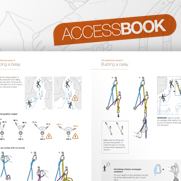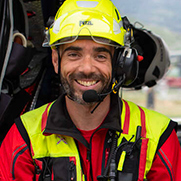Packaging: a new step towards zero plastic
Five years ago, we embarked on an ambitious project to eliminate plastic from all our packaging. This is a green objective that goes beyond a simple technical challenge and speaks volumes about our intrapreneurial spirit. We caught up with Lucas Arnaud, Packaging Project Manager, and Thomas Marchand, Publishing and Packaging Manager to hear more about this collective quest for innovation and sustainability.
May 22 2025
Rapid and spectacular reduction
In 2021, Petzl’s packaging included 80 tonnes of plastic every year. Headlamp bulb packaging was redesigned first, because of its volume. Starting with this product range, which is well known by users, has made for an impact that is both tangible
and symbolic.
Using recyclable materials such as cardboard, it has been possible to cut the quantity of plastic used in Petzl packaging by 56 tonnes. This breakthrough has paved the way for wider consideration of other product ranges, such as the VERTEX and STRATO professional helmets, which until now have been protected by a thermoformed plastic liner made from 25% recycled PET - representing 12 tonnes of plastic a year.
The fruit of 2 years of research
The packaging solution for these helmets is a stackable open box, through which the top of the helmet protrudes. “Stackability saves 30% of volume, which is important for products transported on pallets, in very large quantities,” explains Lucas, who joined Petzl 3 years ago after working with a cardboard manufacturer for several years.
The transparent plastic protection, which until now had covered the visible part of the helmet, protected it from dust and scratches, while making it possible to see the colour. “The challenge was to find an alternative that ensured optimum protection and stackability, without compromising on quality,” explains Lucas. They successfully resolved this technical challenge, through two years of research and painstaking experimentation and optimisation.
“We started with an ideation phase, followed by prototyping and costing. The final solution chosen is the one that meets the requirements. Industrial and laboratory tests provide supplementary information to support our choice,” explains Lucas.
“It was a big team effort, coordinated by a product range project manager with significant involvement from packaging, industrial operations, quality and purchasing,” adds Thomas.
The solution adopted for the packaging of VERTEX and STRATO helmets is a removable sheet of highly resistant kraft paper made of virgin fibres, which is 100% recyclable. As for the cardboard box, it has been reinforced and opened at the sides, so that you can still see the colour of the helmet.
Measurable progress
For these professional helmets, “we went from 12 tonnes of plastic to 0, which corresponds to CO2 savings of around 92 tonnes every year”, points out Thomas. And the team is very proud of it! Performance is tracked using internal tools that accurately document progress, analysing the reduction in plastic used, the carbon impact avoided and logistical gains.
Regular assessments are carried out to validate technical choices and guide the next stages of the transition. They help to mobilise and support collective efforts to gradually improve design practices.
Combining eco-design and savings
This innovation has also made it possible to optimise logistics while making environmental and economic savings.
Thanks to the new design, an additional layer can be added to each pallet, reducing the number of trucks needed for transport. With hundreds of thousands of helmets, these savings mean a considerable reduction in our carbon footprint.
Another important detail is that the sheet of kraft paper costs much less than the plastic protection, providing not only environmental but also economic benefits.
The last mile
With this new advance, plastic consumption in packaging has fallen even further, to 10 tonnes by the end of 2024.
The next stage will be minigrips and polybags, the plastic bags used for spare parts and some accessories, as well as the plastics used for protection during transport, corresponding to around 1,000 products.
As is so often the case, it’s this ‘last mile’ that is the most difficult. The biggest obstacles are the number of products concerned and the alternatives available on the market. Cellulose-based solutions are being considered.
Our teams are ready for the challenges ahead.
Related article: “Illuminating More Sustainable Solutions”
Related News



